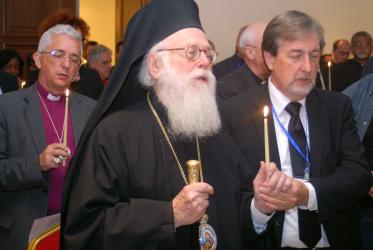Displaying 221 - 240 of 284
28 February - 01 March 2016
Washington D.C., United States - Attendance by invitation only.
Symposium focuses on religion, violence, extremism
04 February 2016
Jürgen Moltmann leads ecumenical reflections in Geneva
14 January 2016
Basel University honors Ghanian Methodist theologian
09 December 2015
WCC Executive Committee works toward a future of peace and justice
19 November 2015
WCC more united in the pilgrimage of justice and peace
13 November 2015
Taizé - Living Ecumenism
01 October 2015
WCC urges responsibility for and support to the refugees in Europe
04 September 2015
New departure in Taizé towards an ecumenism of solidarity
20 August 2015










